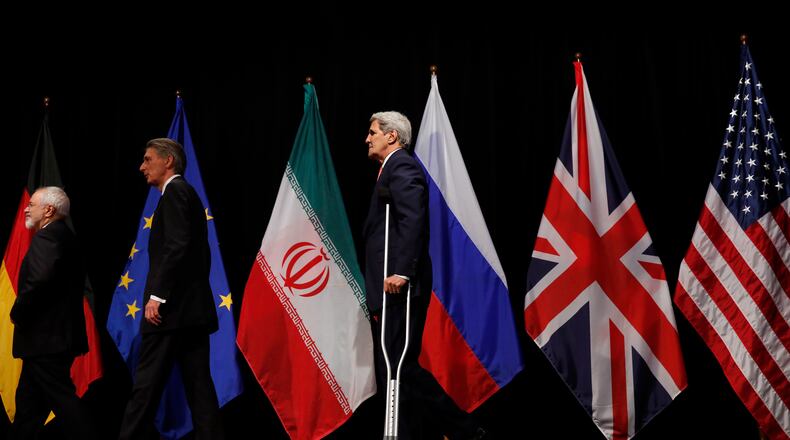President Obama has his deal with Iran . That sentence was always going to be written one day, because no serious person believed, as Secretary of State John Kerry still insists, that Obama was willing to walk away from the table. Nothing about his actions in these negotiations -- nor, really, during his presidency -- suggests that was true.
So there was going to be a deal. And the question was always going to be whether it would be a relatively good deal (perfection in these matters is impossible) or a relatively bad deal. As details about the deal continue to emerge, I suggest your answer to that question depends on whether you believe the nature of the Iranian regime is likely to change in the next 15 years.
The central feature of this deal, it appears at this stage, is its series of expiration dates. First comes the expiration of the asset freeze that has kept some $100 billion (more than 25 percent of the county's GDP; so, a heckuva lot of money) out of Tehran's hands. Then comes the the expiration of a U.N. ban on conventional arms sales involving Iran, in no more than five years. After that, the expiration within eight years of a U.N. ban on ballistic-missile sales to Iran. Finally, the deal lasts only 10 years in total, albeit with a five-year wind-down afterward.
So the question is whether you believe the Iranian regime -- which continues to sponsor terror against its sworn enemy Israel via the likes of Hezbollah, and to back Syrian dictator Bashar al-Assad in the murder of his own people, among other examples of regional adventurism -- will greet an infusion of money, new global respectability and lowered limits on its arms dealings as an opportunity to mellow out as it approaches middle age.
Obama spoke this morning of a deal "not built on trust, (but) on verification," but that is almost certainly incorrect. First, the deal gives Iran another 24 days before inspections can begin, time to finish any scrubbing of the sites already under way. The inspections and other features of the deal intended to allow for verification -- the stick to go along with the carrots -- are premised on the idea of a "snapback" of sanctions. But these sanctions had only become effective after they had been in place about as long as this deal will last. And even in the unlikely event Russia (and China) would assent to reinstating sanctions, Iran will already have its money. The decade spent squeezing Iran to the point it had to negotiate has been traded for a decade-long deal that cannot repeat the rigor of those sanctions.
One constant in Obama's foreign policy has been his complete misreading of the people with whom he has dealt. The "reset" with Russia only emboldened an already aggressive Vladimir Putin. The intervention in Libya yielded a more dangerous country overrun by terrorists. The chemical weapons "red line" in Syria was (and continues to be) summarily ignored by Assad. The "JV team" known as ISIS now seriously threatens the Iraqi security bought by much American blood and treasure. Our only unswerving ally in the Middle East, Israel, is viewed with contempt by the administration and has come to return the favor. Our more tenuous allies in the Gulf states are slowly concluding they cannot trust us any longer. Cuba is getting all the benefits of normalized relations with the U.S. even as the regime's political enemies languish in its prisons. None other than Jimmy Carter deems the Obama presidency as one in which America has lost standing in the world .
Now we are to believe that Iran can be trusted to hold up its end of this bargain, because of untested verification measures to be implemented after the farm has already been given away. We'll get right on that verification, just as soon as we secure the OPM website from foreign hackers.
In light of all this, maybe Obama's supporters are right, and this was as good a deal as Obama could negotiate. More's the pity, then, that you go to the negotiating table with the president you have, not the president you might wish to have.
About the Author
Keep Reading
The Latest
Featured
